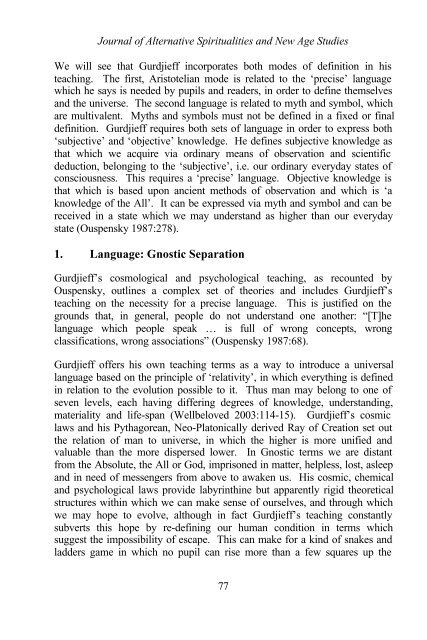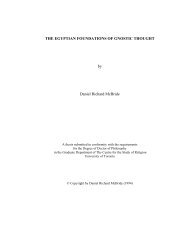Gurdjieff, 'Old' or 'New Age': Aristotle or Astrology? Sophia ...
Gurdjieff, 'Old' or 'New Age': Aristotle or Astrology? Sophia ...
Gurdjieff, 'Old' or 'New Age': Aristotle or Astrology? Sophia ...
Create successful ePaper yourself
Turn your PDF publications into a flip-book with our unique Google optimized e-Paper software.
Journal of Alternative Spiritualities and New Age Studies<br />
We will see that <strong>Gurdjieff</strong> inc<strong>or</strong>p<strong>or</strong>ates both modes of definition in his<br />
teaching. The first, Aristotelian mode is related to the ‘precise’ language<br />
which he says is needed by pupils and readers, in <strong>or</strong>der to define themselves<br />
and the universe. The second language is related to myth and symbol, which<br />
are multivalent. Myths and symbols must not be defined in a fixed <strong>or</strong> final<br />
definition. <strong>Gurdjieff</strong> requires both sets of language in <strong>or</strong>der to express both<br />
‘subjective’ and ‘objective’ knowledge. He defines subjective knowledge as<br />
that which we acquire via <strong>or</strong>dinary means of observation and scientific<br />
deduction, belonging to the ‘subjective’, i.e. our <strong>or</strong>dinary everyday states of<br />
consciousness. This requires a ‘precise’ language. Objective knowledge is<br />
that which is based upon ancient methods of observation and which is ‘a<br />
knowledge of the All’. It can be expressed via myth and symbol and can be<br />
received in a state which we may understand as higher than our everyday<br />
state (Ouspensky 1987:278).<br />
1. Language: Gnostic Separation<br />
<strong>Gurdjieff</strong>’s cosmological and psychological teaching, as recounted by<br />
Ouspensky, outlines a complex set of the<strong>or</strong>ies and includes <strong>Gurdjieff</strong>’s<br />
teaching on the necessity f<strong>or</strong> a precise language. This is justified on the<br />
grounds that, in general, people do not understand one another: “[T]he<br />
language which people speak … is full of wrong concepts, wrong<br />
classifications, wrong associations” (Ouspensky 1987:68).<br />
<strong>Gurdjieff</strong> offers his own teaching terms as a way to introduce a universal<br />
language based on the principle of ‘relativity’, in which everything is defined<br />
in relation to the evolution possible to it. Thus man may belong to one of<br />
seven levels, each having differing degrees of knowledge, understanding,<br />
materiality and life-span (Wellbeloved 2003:114-15). <strong>Gurdjieff</strong>’s cosmic<br />
laws and his Pythag<strong>or</strong>ean, Neo-Platonically derived Ray of Creation set out<br />
the relation of man to universe, in which the higher is m<strong>or</strong>e unified and<br />
valuable than the m<strong>or</strong>e dispersed lower. In Gnostic terms we are distant<br />
from the Absolute, the All <strong>or</strong> God, imprisoned in matter, helpless, lost, asleep<br />
and in need of messengers from above to awaken us. His cosmic, chemical<br />
and psychological laws provide labyrinthine but apparently rigid the<strong>or</strong>etical<br />
structures within which we can make sense of ourselves, and through which<br />
we may hope to evolve, although in fact <strong>Gurdjieff</strong>’s teaching constantly<br />
subverts this hope by re-defining our human condition in terms which<br />
suggest the impossibility of escape. This can make f<strong>or</strong> a kind of snakes and<br />
ladders game in which no pupil can rise m<strong>or</strong>e than a few squares up the<br />
77










